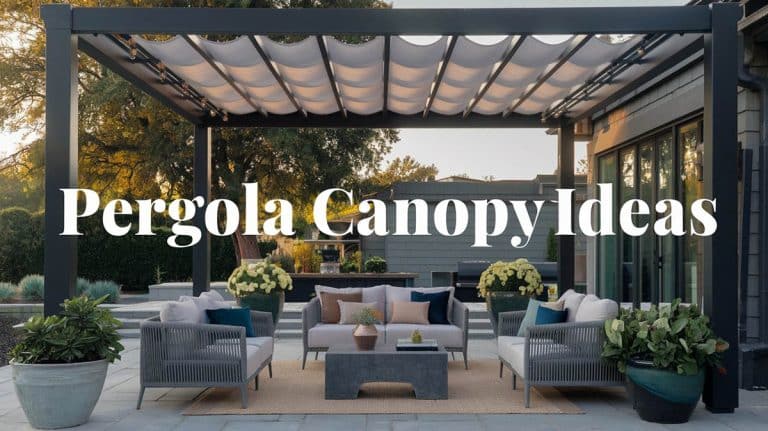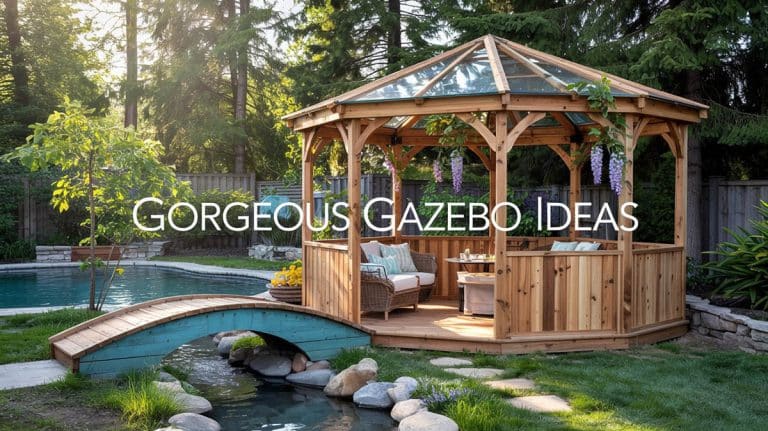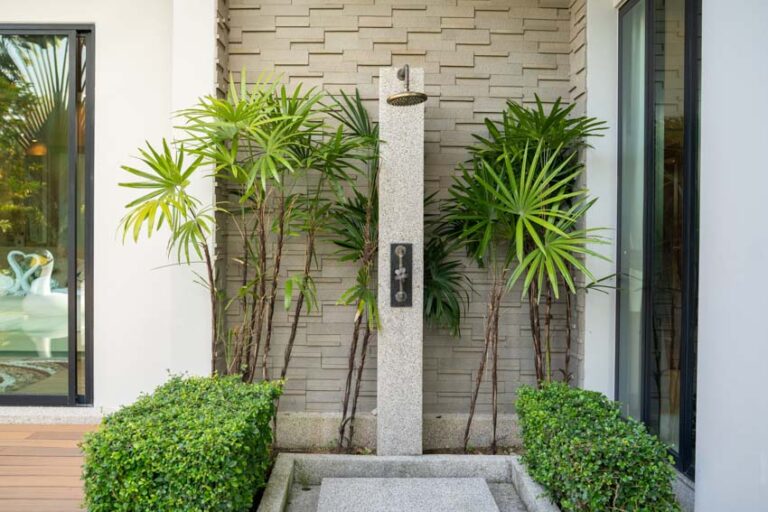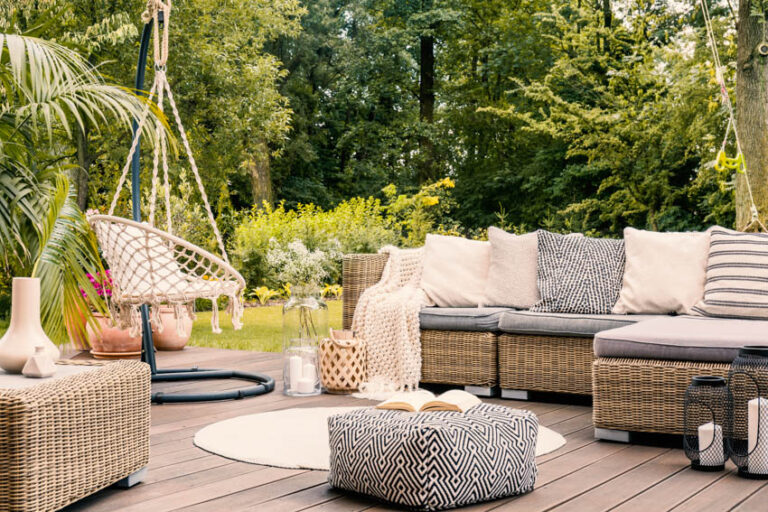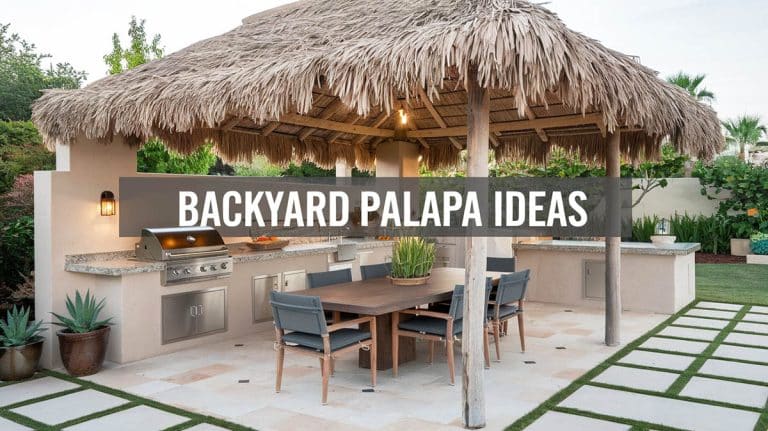Epoxy Countertops For Outdoor Kitchens
Here we cover epoxy countertops for outdoor kitchens including what it is, if it can be used outside, epoxy countertop pros and cons, cost, and maintenance.
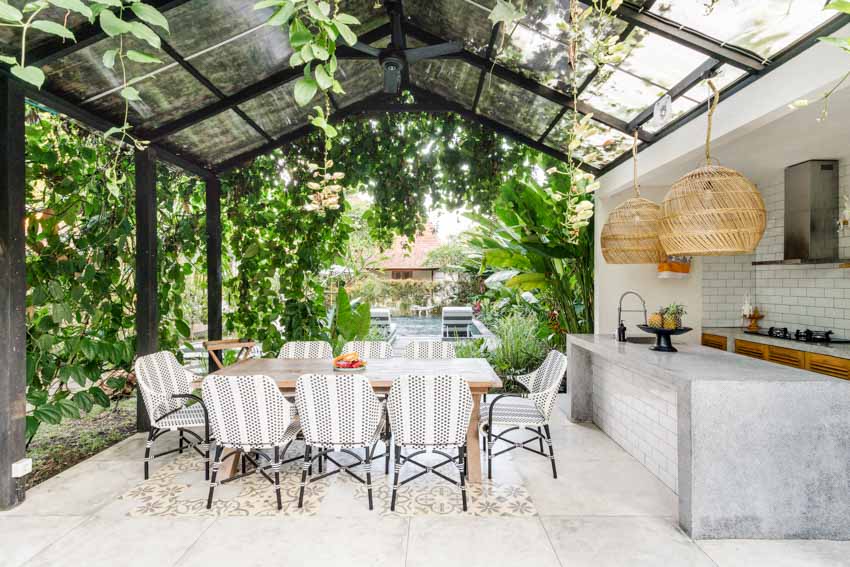
It has also become a rising trend in the materials of design since it creates unique and amazing effects for countertops. It is also gaining popularity due to its adaptability due to the various colors and designs available.
What Is An Outdoor Epoxy Countertop?
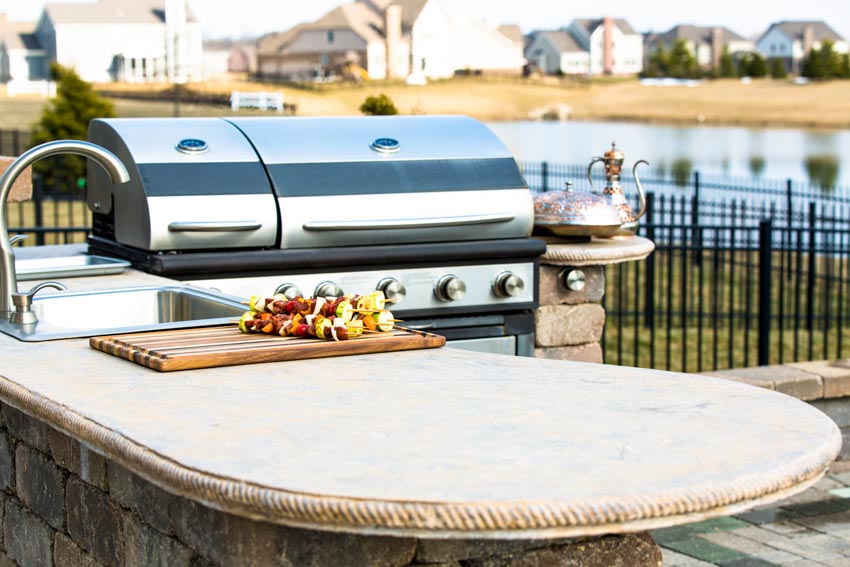

Upload a photo and get instant before-and-after room designs.
No design experience needed — join 2.39 million+ happy users.
👉 Try the AI design tool now
Like other resin-based countertop materials, epoxy countertops are a combination of resin and hardener that produces a clear and durable solid-surface material.
As a finishing material, it is compatible with most countertop materials, including wood, metal, concrete, ceramic, laminate, and Formica. Epoxy products used as countertops can recreate the look of granite or marble at a far lesser cost.
Can Epoxy Countertops Be Used Outdoors?
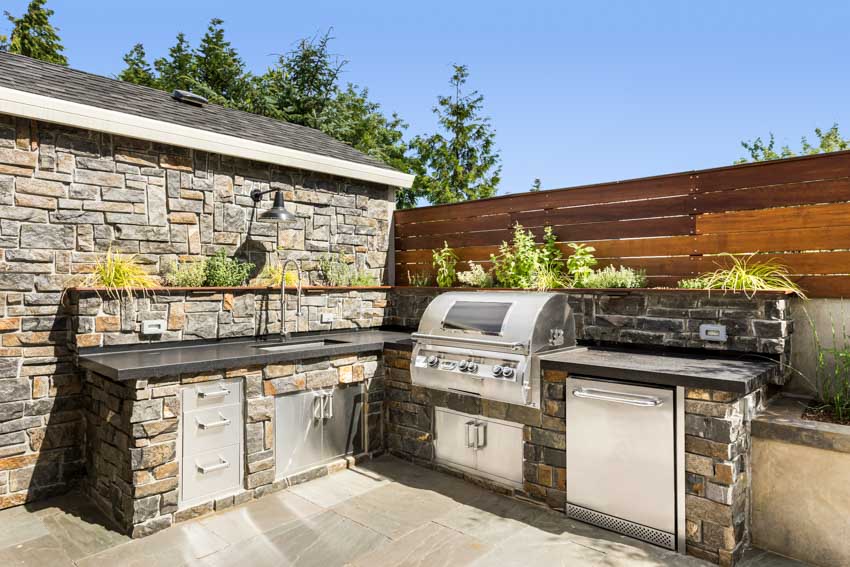
As it dries, it becomes super hard resulting in it to withstand everything it is exposed to, including heat, extreme weather conditions, and heavy use. Epoxy countertops require simple cleaning and if properly maintained, they can last up to 30 years.
Another important quality of epoxy countertops is that they are easy to keep clean which is advantageous when it comes to outdoor spaces. Epoxy resin is also waterproof and can withstand a lot of moisture.
It is not as sensitive to water damage compared to other types of plastic materials too. It is non-porous and non-toxic as well as scratch resistant, so it is perfect for outdoor kitchen countertops.
Epoxy Countertop For Outdoor Kitchen Pros And Cons
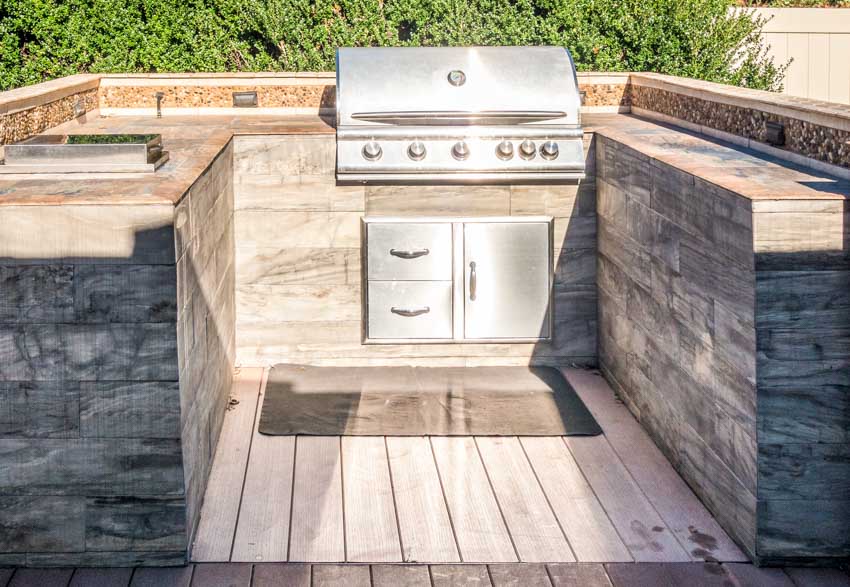
Pros of Epoxy Countertops
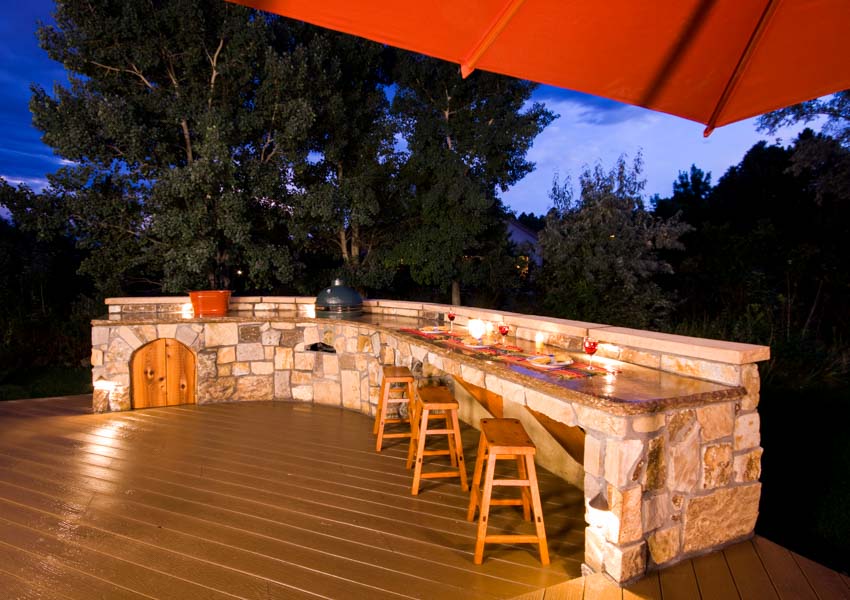
Plus, it has a long-lasting shine. In case the epoxy countertop obtains some scratch, it can be sanded and polished. You do not have to replace it entirely.
Heat Resistant: Due to their non-porous characteristic, epoxy countertops are resistant to heat up to 500F degrees (260C). An epoxy countertop is five times stronger than concrete and it is also shock resistant.
However, epoxy countertops are not steam or heatproof and so hot pots and pans should not be placed directly on the countertop. Always make sure to use hot pads in order to protect the epoxy countertop surface.
Appearance: Another advantage of the epoxy countertop is its high-gloss finish that reflects light back into your kitchen. The high gloss finish also creates a sleek and smooth surface. Epoxy countertops can be customized to produce a variety of colors, texture, and effects that creates a unique outdoor countertop.
The solid colors of epoxy are popular due to having less pigment. A semi-translucent effect also is attractive and produces a unique appearance since it can be enhanced with backlighting.
Seamless surface: Epoxy countertop allows homeowners and designers to create a sleek and seamless surface since it comes as a liquid that hardens to a solid countertop. It provides an overall versatility with continuous texture and patterns including different colors.
Food-Safe: Epoxy is made of two primary ingredients – Bisphenol F (BPF) and Bisphenol A (BPA) and is in compliance with the FDA’s thorough regulations. After the curing process, the epoxy resin used for countertops is treated as non-toxic, therefore considered safe for food preparation. It is also resistant to the growth of fungi, yeast, bacteria, or other microorganisms.
Low maintenance: Epoxy countertops are easy to clean and water repellent. Most non-abrasive household cleaners such as mild detergent or dishwashing liquid can be used to wipe the surface of an epoxy countertop to keep it spotless, shiny, and give it streak-free cleanliness. Stay clear in using harsh cleaners and avoid using bleach as these items can damage your epoxy kitchen countertops.
In order to maintain the epoxy countertop in its best shape, use mineral or Murphy’s Oil for weekly or monthly cleaning. Avoid using too much to prevent the countertop from becoming dull and hazy. Do not use sharp items to loosen stuck-on food, instead use a steam cleaner to get rid of the stuck-on food.
Cons of Epoxy Countertops
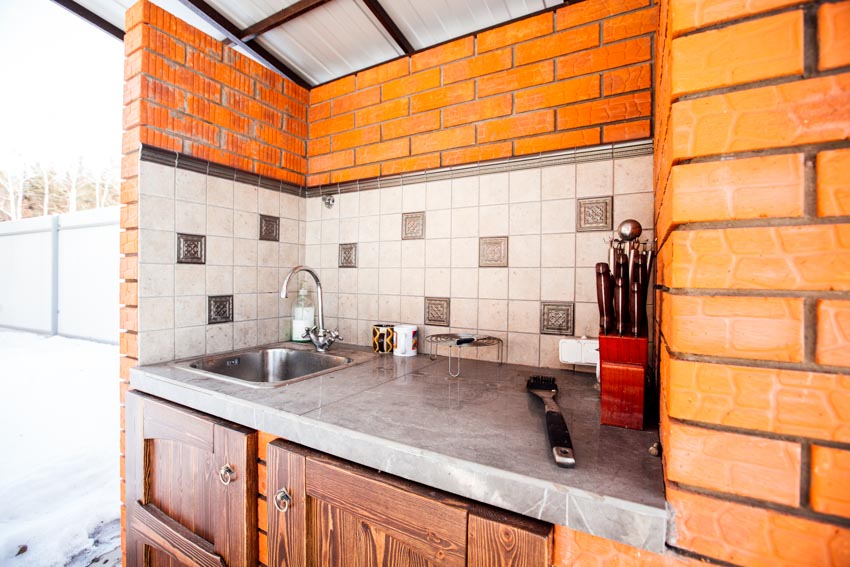
Epoxy application requires an expert to produce a consistent look and to create positive results. Mimicking different effects including veins, swirls, faux, metallic, and artificial fractures can be tough due to the lack of consistency.
Labor-Intensive: Application of epoxy can be time-consuming due to a lot of preparation involved. It is very much time-dependent as it typically only has 20 to 30 minutes before it starts to harden. As well as time-consuming since it takes between 8 and 12 hours between coats then several days for it to harden and cure before normal use.
Inconsistent Quality: Another significant factor to be considered as a disadvantage for epoxy, is its varying product quality which does not guarantee the same results. It is quite easy to make mistakes and end up with a surface that has air bubbles or that the epoxy can drip off the edges as it is being poured and leveled.
The manufacturing date of the epoxy product and its resistance to heat are just a few of the qualities that play an important factor in the outcome of the epoxy countertop project. Some epoxy can stain easily if spills remain on the counter for an extended period of time.
Staining: Although durable, epoxy countertops can incur stain if food item or spills is allowed to remain on the countertop surface. To prevent stains from occurring, wipe any spills immediately and remove any remaining traces of the substance by using a clean cloth with a drop of dishwashing liquid and some hot water. Make sure that all soapy residue is removed and allow the surface to dry.
Not easy to reconstruct: Unlike other countertop materials that are available in pre-finished slabs, it only takes one shot to create customized epoxy countertops – not much room for second chances with the work and the results can sometimes look less than natural.
Although there is the possibility of repair, it would mean investing more time to sand it and redo many of the steps you took to make it. Thus, spending more money on the project.
Outdoor Epoxy Countertop Cost
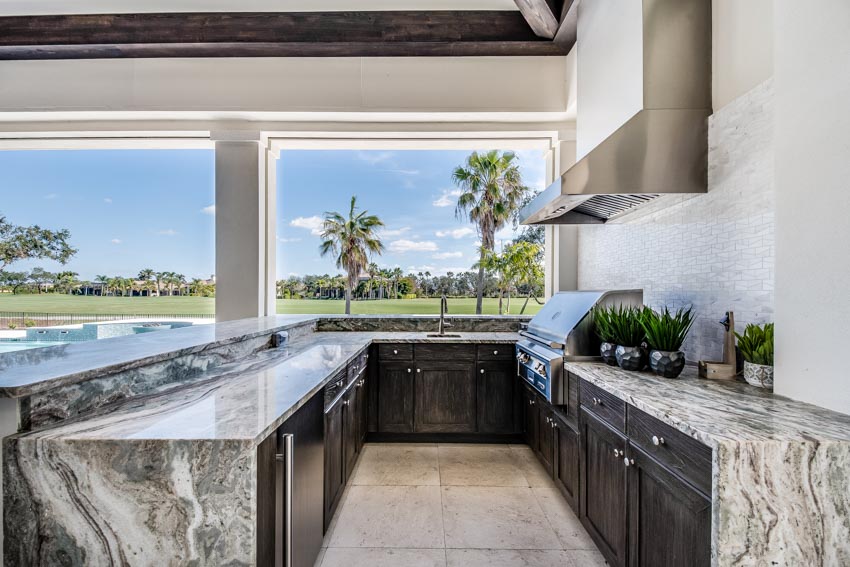
If you wish to incorporate some color, you will need to mix mica powder into the resin which will be an additional cost to the project. Plus, also consider the risk of not getting the work done on the first try considering how difficult it is to install these types of kitchen countertops.
In addition, hiring a professional to install the countertop which is highly recommended will mean having to spend an extra $100 per square foot. Whether you want to install your countertops yourself or hire a professional, epoxy countertops are still a good investment in a long-lasting and unique option for outdoor countertops.
Will Epoxy Melt In The Sun?
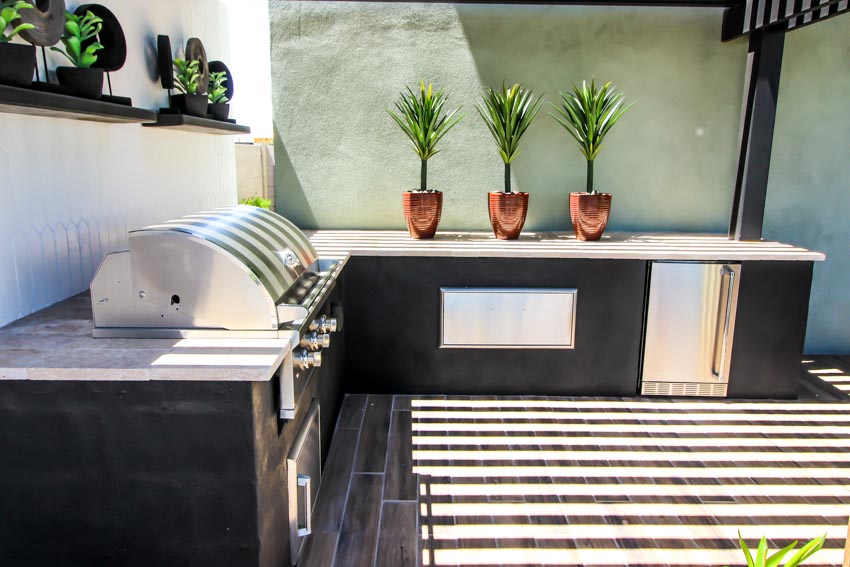
Since epoxy resin is a thermoset polymer and is cured by heat, it cannot be remelted once they have been cured. It is durable enough to be used for epoxy patio flooring applications as it can withstand a lot of foot traffic.
However, when exposed to UV light either directly or indirectly it can cause the epoxy countertop to lose its glossy appeal and show yellow discoloration. For colored epoxy countertop, exposure to UV light can result in chalking and breakdown of the epoxy coating. For this reason its advisable to use UV-resistant epoxy installations.
Does Epoxy Yellow In The Sun?
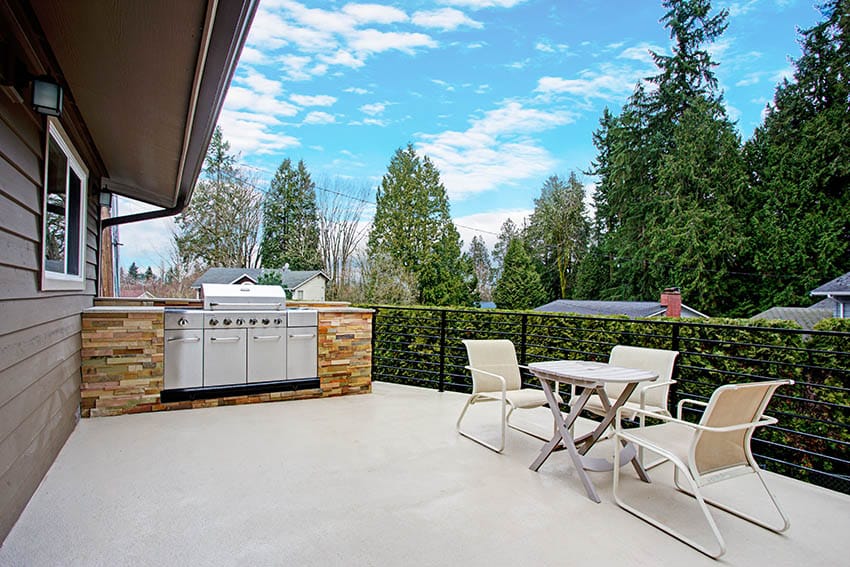
Choose a UV-resistant epoxy brand that has a layer of protection against the rays of the sun and prevents it from yellowing even after years of exposure to UV rays.
Another way to protect your epoxy countertop is by using high-grade additives such as liquid dye, metallic powders, spray paints, and glider adhesives can help strengthen the epoxy resin and slow down the yellowing when used outdoors.
Applying a layer of polyurethane coating is an additional option for making outdoor epoxy countertop UV resistant. For optimum results, it is highly recommended to apply multiple applications of polyurethane.
For epoxy countertops that are used outdoors, choosing an epoxy with a darker shade, or opting for yellow-based colors will help yellowing from being noticed easily since epoxy resins eventually become yellowish after some years.
How Long Will Epoxy Last Outdoors?
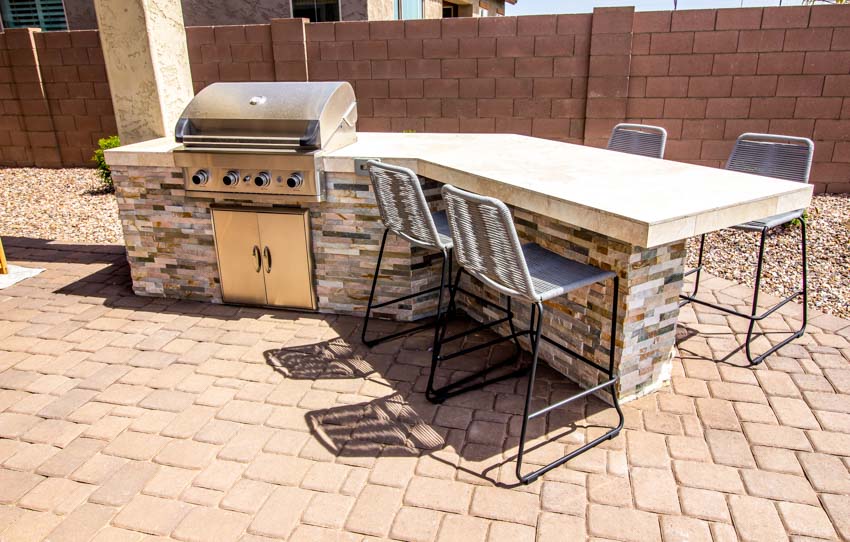
Epoxy resin will usually last a minimum of 5 years to 15 years on average without any cracking or peeling if properly taken care of. To help prolong the life of the epoxy countertop outdoors, consider installing it in a shaded area whenever possible.
There are outdoor grade epoxy resins, which are absolutely UV-resistant that it can be used for outdoor purposes. Without a UV-resistant additive and coating, epoxy resin can begin to yellow and break down when exposed to the sun over time. Nonetheless, it is an excellent choice for an outdoor countertop.
Outdoor Epoxy Countertop Maintenance
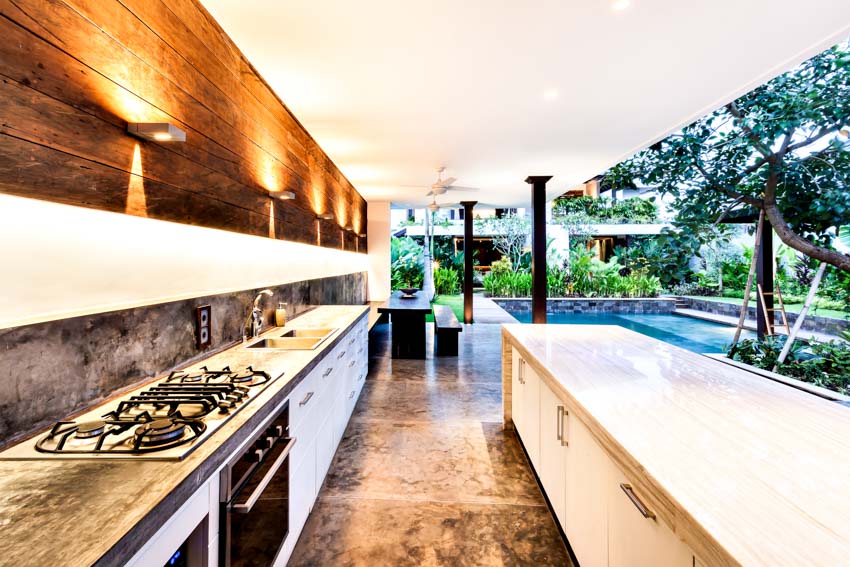
Use acetone or paint thinner and wipe thoroughly with a clean rag or paper towel spills from the surface of the epoxy countertop. An occasional and moderate application of mineral oil or Murphy’s Oil® can be applied to restore the luster of the outdoor epoxy countertop.
Chamois cloth can be used to buff the countertop to the desired sheen. Mild soap, or household cleaner and moist or wet pads, clean rags, or sponges are also some of the approved items that can be used for cleaning and maintenance of epoxy countertops. Never use abrasive pads and polish containing wax to avoid dulling of the epoxy countertop surface.
Applying additives to your epoxy countertop, it helps protect them against UV rays. These additives act as inhibitors that slow the UV effect on your outdoor epoxy countertops.
Epoxy countertops are beautiful, durable, and affordable. A high-quality epoxy countertop will provide a life-long benefit with minimal maintenance. The sleek look and unlimited design potential of epoxy countertops are an excellent option to rival most of the natural and exquisite stone countertops available on the market.
With everything said about epoxy countertops for outdoor kitchens, we hope that by now you are convinced that they are an excellent option to use outdoors and can add value to your home.
See more related content in our article about outdoor kitchen on a budget on this page.

